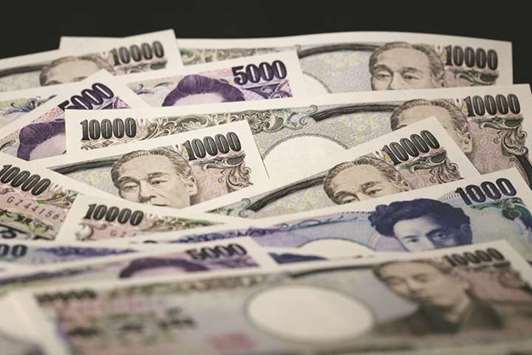It’s still early, but there are signs Japan’s equity market is approaching escape velocity when it comes to a force that has entranced it for years.
It’s the yen, whose level against the dollar has generally been all you needed to know to tell where exporter-heavy indexes like the Nikkei 225 Stock Average were trading.
Suddenly the link is loosening as the economy shows signs of stability and corporate earnings rise.
Even with the yen trading near a four-month high, Japan’s benchmark Topix index has risen more than 6% since the start of the second quarter. Correlation between the two assets has fallen to -0.18, the lowest level since 2012, based on their weekly changes.
“Companies are doing well in Japan,” Nicholas Weindling, a Tokyo-based money manager at JPMorgan Asset Management said by phone. “Net profits are growing at over 20% so even without the follow-in of a weakening yen, companies are doing well and ultimately everything should come back to company fundamentals in the long-term.”
Topix members beat analyst profit estimates by an average of about 16% in the latest quarter. A slew of positive macroeconomic data, including the longest expansion in more than a decade and a pickup in household spending in June, is also boosting investor sentiment. The Bank of Japan continues to purchase exchange-traded funds.
The 13-week correlation between stocks and the yen reached high of 0.83 this year in February, ahead of Prime Minister Shinzo Abe’s first meeting with US President Donald Trump. Its recent downtrend started in May, as the Topix index continued to trend higher, albeit in a narrow range of less than 100 points. “If you say that you think the yen is going to strengthen, and you’re bullish on the stock market, people think you’re mad,” said Jonathan Allum, a strategist at SMBC Nikko Capital Markets in London. But “the evidence from the economy and the corporate data is that Japan is not as vulnerable to a strong yen as people think.”
Not everyone buys that theory. According to the head of Japanese equities at UBS’s wealth management unit, Toru Ibayashi, the yen should be the “single biggest factor” impacting Japanese corporate earnings as many companies derive most of their earnings from overseas.
More than 1,800 out of 2,015 companies on the Topix index derive over 50% of their revenues outside of Japan, Bloomberg data show.
The strength in the yen isn’t quite pronounced either when measured by the currency’s value against a basket of its peers.
The nominal effective exchange rate has risen a mere 1.6% this year, compared with a 6.7% advance against the dollar.
The yen has weakened to 109.66 per dollar since touching 108.60 on August 18, the strongest since April 19. Economists forecast Japan’s currency will depreciate further to 114 in the first quarter of 2018, according to data compiled by Bloomberg.
Earnings per share in the Topix have risen 27% year- on-year this quarter as the yen traded between the range of 108 to 114 per dollar.
The benchmark gauge has a price-to-earnings ratio of around 15, below S&P 500 Index’s 19 times level and the Stoxx Europe 600 Index level of 16 times.
Earnings growth has been very strong in Japan but the market hasn’t become any more expensive like that in the US, JPMorgan’s Weindling said. “That’s a powerful reason to look at Japan more seriously” because companies earnings have delivered, he said.

Economists forecast Japan’s currency will depreciate further to 114 in the first quarter of 2018, according to data compiled by Bloomberg
